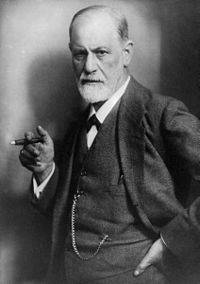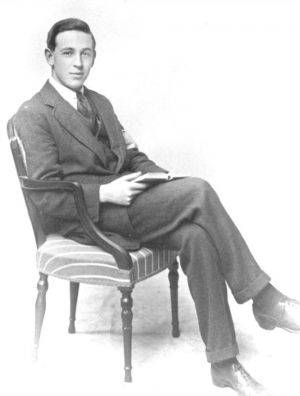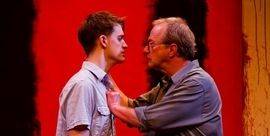“Sometimes a banana is only a banana … Anna.”
Whenever I hear someone mention Sigmund Freud, the pioneer of psychoanalysis, that’s the line that comes to mind. Even though I have studied Freud’s ideas, read his writings, and partaken of his methods, I hear Dan Aykroyd’s voice from a vintage Saturday Night Live sketch. In it, Freud is comforting his daughter after a bizarrely over-the-top Freudian-dream description with heavy Electra leanings. And … Scene.
The Celebration Company at the Station Theatre’s final summer offering, Mark St. Germain’s Freud’s Last Session is decidedly less flippant. It depicts a fictitious encounter between the dying psychoanalyst and a young writer by the name of C.S. Lewis as England is on the brink of entering the fray of World War II. The gobsmacked Lewis thinks he’s going to be admonished for a send-up of Freud’s methods in his latest book, but what transpires is a fascinating debate on love, sex, death, and the existence of God, with a bit of Nazi discussion thrown in for good measure. It is a single-set play of words and ideas that had a successful Off-Broadway run in 2010, and its weighty topics and meta-realistic encounter seems custom designed for the intimate confines of the Station.
Recently, I had the pleasure of a virtual interview with the impressive production team of director Tom Mitchell and actors Gary Ambler and Jesse Angelo about this show’s unique challenges. For starters, this show is unique to the Station due to its intensely truncated rehearsal period. Mr. Angelo’s studies abroad have left only a ten-day window to mount this impressive piece. A lesser team might find this daunting, but Mitchell’s experience as a University of Illinois faculty member and director, and the actors’ previous work together on the Station’s recent and outstanding production of John Logan’s Red (pictured below) definitely herald this production’s success. The following are a series of questions posed to the trio, just before their fast and furious rehearsals began, along with their thoughtful responses.
Smile Politely: What was it that drew the Celebration Company to green-lighting this production of Freud’s Last Session?
Gary Ambler: I approached the programming committee for the summer season about scheduling a project in which Jesse Angelo and I could act. Jesse and I had been talking during the year while he was in acting training in London about the possibility of putting together a small acting project which could fit in to a very compressed rehearsal time. By April, it was looking probable that our schedules would align, and I told the selection committee about it. They green-lighted it as a project for the summer season, without a title. We then asked Tom Mitchell if he would direct. He agreed, and we began sharing play ideas and finally came up with Freud’s Last Session.
SP: As a director, what attracted you to this script, and what would you like the audience to take away from your production?
Tom Mitchell: What truly attracted me to this project was the opportunity to work with Gary and Jesse on this play in an intense and focused rehearsal period. Much of the directing I do has me working in long rehearsal periods with young actors. Much of the emphasis falls on education in the process. I enjoy that, but working with capable actors on a serious play in a week and a half should keep us all awake and aware.
I like the idea of offering a play in the summertime that engages brains as much as sporting events engage our emotions. Freud’s Last Session is a bit like the final match at Wimbledon: two players who are at the top of their game struggle in a match of ideas. The enjoyment of the event is in the quality of their argument, not in who wins or loses.
 What have you done conceptually to make the play work in the space of the Station?
What have you done conceptually to make the play work in the space of the Station?
Mitchell: I think this play suits the theatre very well. It is an intimate encounter set in Freud’s office in 1939. The intimacy of the Station helps audiences to listen and comprehend the ideas. I am stripping away a lot of realistic detail to get us focused on the human interaction. The growing threat of war and Freud’s deteriorating health are influences that add tension.
SP: What has been the biggest challenge of mounting this production?
Mitchell: One of the challenges is the anticipation and waiting to begin. Jesse isn’t back in the U.S. yet, so we await his return to get started. I am also aware that a play of ideas can become dull unless the actors find ways to invest their characters with a passionate belief in their point of view. These actors should bring the characters vividly to life.
SP: As actors, what is your biggest challenge to playing a historical figure?
Jesse Angelo: Discovering who the person really was. Much research material you gather needs filtering and sifting in order to pair away bias, judgment, and clutter. Because there’s a responsibility to portray the person as accurately as possible, you try to find aspects and elements of the person that are usable in creating a character. It’s a game of finding bits of truth about the person that you can hang your hat on; like milestones on a long journey, they keep you on the right path.
Ambler: I suppose it’s the struggle to keep it human, and avoid the iconic. Freud figures large in our collective consciousness, so the challenge for me has been to avoid the common conceptions (and misconceptions) and allow the character in this “particular” story to live. Also, as an eminent intellectual, Freud’s ideas and beliefs sometimes seem larger and separate from Freud himself; my job is to give the intellect to this particular, singular man.
 SP: What is your biggest challenge as an actor in bringing the character to life?
SP: What is your biggest challenge as an actor in bringing the character to life?
Ambler: There are two challenges that come immediately to mind. First, to construct a believable emotional arc to the character’s life in the life of the play. The play is a conversation over a number of subjects with some surprising interruptions, and on a fateful day in England. But it must operate in real time, so the actor has to navigate a few emotional hairpin turns. And second, in this play we see Freud at the end of his life and battling illness; there’s inherent tension between his physical abilities and his intellectual vitality.
Angelo: [My biggest challenge is] trusting and believing that, as an actor, I am half of the equation to creating a living, breathing C.S. Lewis on stage. For some reason, when you play a historical figure, the quest to ‘become the person’ exists so prominently in your mind that it can start to override the actor’s gut instincts and impulses while working in the space. It’s easy to think, ‘Oh Lewis wouldn’t do that…’ It’s a trap, and this is where a good director can be a lifeline; they remind you to bring your own humanity on stage. You can’t leave yourself behind.
SP: What attracted you to this project?
Angelo: The ideas that Freud and Lewis argue are just as prevalent today as they were in 1939. Religious conflicts, wars, dictators are all the front page of any major newspaper. It makes you wonder how much has really changed since WWII. I was also very interested that the play sets these two completely factual characters in a completely fictional meeting. All of the subject matter is accurate, even some of the words and phrases are their own actual words, though the two men never really met. That intrigues me.
Ambler: Rick Orr first brought the play to my attention a few years ago. Then, when Jesse and Tom and I were looking at possible projects, it came back. We needed a play for two men — young and old — with, preferably, small technical needs, that could be rehearsed and mounted in a very short rehearsal period. Freud’s Last Session fit the criteria. Plus, it offered a good acting challenge, smart conversation, and good conflict. Most attractive was the opportunity to reconnect onstage and off with Jesse, a good friend and a good acting partner.
SP: What do you hope an audience gets out of this production?
Angelo: I think the play will mean very different things to different people. Some may be interested in the intellectual arguments of the characters, and others may not care for that, but will enjoy the fervor and energy of the two men colliding. What I really hope is that the audience is sucked into the world of the play and has a moment where they can gape at the weight and importance of the day.
Ambler: I hope they’ll be surprised by their responses, and be engaged by the argument. It’s a play that may seem to be asking the audience to take sides, but at its end, we’re left with a third side. I hope they’ll also be surprised by how warm and funny these men can be.
***
Freud’s Last Session opens Thursday, July 25, at the Station Theatre in Urbana. It has a short two-week run, so make your reservations soon if you plan to attend. Seats can be reserved by calling (217) 384-4000 or by visiting the Station website.
Red photo by Jesse Folks.








